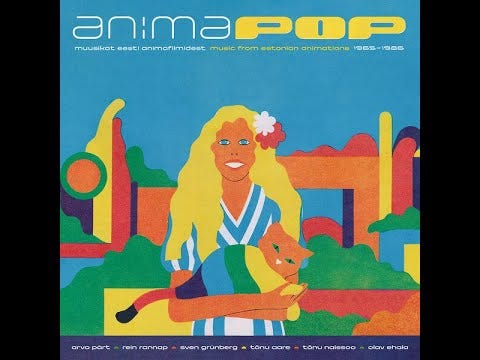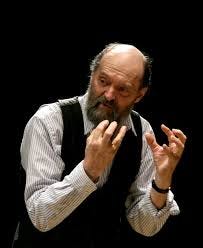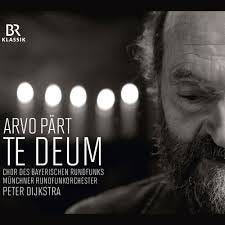Maybe Arvo Pärt needed the money.
He was young. The ‘60s were breaking out all over the world, and how much of a baller could he really be working as a producer at Estonian public radio?
Whatever the motivation, in 1965 Pärt – now 88 and revered globally for his vast, slow-moving and sublimely layered contemporary classical music – did some work for hire: He created a few pieces for the Tallinnfilm animation studio that were used to accompany cartoons. He wrote a blues-centered piece featuring electric organ (“Theme From Mouse Hunt,” which opens the above compilation) and an ersatz cha-cha complete with bongo drums (“Cameraman Kops on a Desert Island”).
Those pieces are part of an intriguing 2023 compilation called Anima Pop: Music from Estonian Animations 1965-1986. The Pärt works, written a decade before he developed his identity as a composer, sit alongside typical sight-gag sound cues and antic marches – as well as unsettling melodies like Sven Grünberg’s “Vocalese from “Flaxen-Hair and Rosalind.” As happens in Hollywood film scores, the sonics change fitfully: Grünberg’s “Theme from “Is It Moving? Yes It Is!” opens with a lament for oboe and mallets, followed by a stately (and metrically tricky) rock anthem with a theme played on synthesizer. This dissolves into a brief and entrancingly idyllic passage of single-note plinking in the top two octaves of the piano.
As a blog post on the Raadio Kohila Records website explains, the mission was to create “a film product aimed at toddlers or preschoolers.” But the young animators, artists and sound designers were given few restrictions: “Relatively free experimentation was allowed. For authors it was a paid job as well as a channel to present their creative self-realization publicly on the screens.”
Here’s a short 1981 clip, with music by Grunberg, that’s featured on the compilation. It’s one of several pieces that oozes a distinctive Sponge Bob Square Pants irreverence.
The Estonian composers involved in this work were clearly enthralled by Western pop culture, specifically rock and roll. They copped the drum patterns and the treble-heavy electric guitar freakouts. They experimented with unusual conjoinings of acoustic instruments with analog synthesizers. Under cover of “background music,” they used the cartoon soundtracks to explore ideas about rhythm, dissonance and improvisation they couldn’t put on their own albums – Estonia was part of the Union of Soviet Socialist Republics, after all. The blog employs a bit of Western marketing panache to hit that point: “This record is the complete antipode to the perceived official values of Soviet youth of the time.”
Anima Pop isn’t recommendable from start to finish. But it’s fascinating as a study of creative subversion, and it’s valuable to history as one of the early markers in the career of the insanely gifted and prolific Arvo Pärt. It reminds us that everyone has to start somewhere: Cue up that kitschy theme from “Mouse Hunt” and just try to draw any kind of solid line between it and “Te Deum” or any of Part’s somber spirit-forward masterworks.
Yet, improbably, there are some connecting threads. Pärt begins “Mouse Hunt” by serving up a totally generic 12-bar blues. He follows that with a bridge that slides gleefully through several key centers. This section temporarily obliterates the stock familiarity of the first theme; it messes with expectations, almost pulls the floor out from under the listener.
In a sense, that’s aligned, at least in terms of intention, with the sprawling forms and elaborate shape-shifting that define Pärt’s landmarks like “Cantus In Memory of Banjamin Britten.” These works dwell in an interior place. They move like glaciers, with a regal grandeur. They’re built on stillness, in layers, on sustained bell-like tones and chords that hover in the air to create a sense of anticipation – or foreboding. Somehow though, for all the calm and deliberation, Pärt’s music courses with motion, modulating constantly, stretching the ear constantly, challenging the complacent listener measure by measure.
The Pärt music on Anima Pop (which is available via Bandcamp here) might not even rate a footnote mention given his huge discography. Maybe it’s not inspiring in itself, but it is undeniably inspiring as a seed. Everybody starts somewhere, with the tools within their grasp; what matters is where they go from there.








Thank you for this. Thank you for everything.